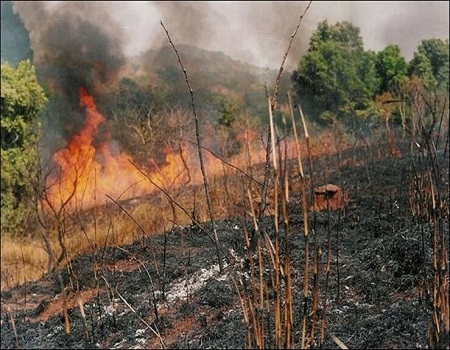Nigerian doctoral student, based in the United States of America, Abdulhameed Fakoya, has pioneered research on long-term evolution of atmospheric particles from wildfires, bush burning and their effects on climate and agricultural production, especially in Africa.
In a statement by the researcher, Fakoya said that the study focuses on improving people’s understanding of tiny atmospheric particles (aerosols), particularly from wildfires and biomass burning, their intricate dynamics and their impact on regional and global climate, which is essential for developing effective mitigation strategies.
“About nine percent of Africa’s land burns annually, contributing large amount of soot (carbonaceous aerosols) which absorb solar radiation in the atmosphere, limiting the amount of sunlight and heat that reaches the land surface, and consequently, inhibiting the convective processes that produce clouds.

“These processes alter the precipitation cycle, accelerate desertification and can lead to extended drought periods, thereby posing severe threats to agriculture and the economy of most countries, including Nigeria”, he said.
Fakoya, a Doctoral student at the University of Oklahoma and a visiting researcher at the National Centre for Atmospheric Research in the United States, said that wildfires affect the climate in various ways, adding that, for example, cloud evaporation can delay rainfall and change precipitation patterns in a region.
He also explained significance of the study, saying:
“This research is crucial to improve climate modeling and to better understand how much these aerosols influence climate forcing. The goal is to contribute to the scientific community’s understanding of aerosol-climate interactions and to inform policy making that would protect the environment.

“Moreover, the projected increase in the frequency and intensity of fire events globally due to climate change presents an urgency to this research”, he said.
Fakoya’s research is shedding more light on how the dynamic nature of wildfire aerosols and he is among the first to study how smoke particles change with regards to their climate impact over long periods. The finding from his work will increase the understanding of how the properties of wildfire particles change during their transport and lifetime in the atmosphere due to complex atmospheric processes.
“These particles absorb sunlight, causing the localized warming in the atmosphere, which can lead to cloud evaporation, and alter the amount of heat that reaches the surface. This affects the climate in various ways. For example, cloud evaporation can delay rainfall and change precipitation patterns in a region. My research shows that the impact of wildfire aerosols on climate is not constant. As these particles move through the atmosphere, different chemical processes alter how they absorb sunlight and influence the climate”.
“Some of these findings will be used to improve the prediction of their climate impact in models.
Driven by a deep-rooted passion for conducting impactful science, Fakoya is pioneering research that integrates multiple measurements from ground-based sensors, aircraft, and climate models to study the long-term evolution of atmospheric particles from wildfires and their extensive effects on climate”.
Fakoya’s passion for impactful science research dates back to his pre-doctoral education at the University of Ilorin where he received a bachelor’s and master’s degree in Physics. His final year undergraduate project studied heavy metal contamination of groundwater. For his master’s thesis, Fakoya employed statistical and machine learning techniques to classify and forecast severe weather events in Nigeria.
While doing his PhD, Fakoya has also contributed to research and field experiments funded by top science institutions in the United States, including National Aeronautics and Space Administration (NASA) and the U.S. Department of Energy (DOE), and has been recognized with numerous prestigious awards.
He has received Best Presentation Awards for his research presentations at the American Meteorological Society and the American Geophysical Union, which are the largest conferences in his field.
Looking ahead, Fakoya aims to continue pushing the boundaries of atmospheric research, focusing on interdisciplinary approaches that integrates science with policymaking.
He is keen on contributing to solving environmental challenges in his home country. Fakoya is a member of the University Corporation of Atmospheric Research (UCAR) Africa Initiative, a program focused on using scientific knowledge and resources to solve air quality and environmental issues on the African continent. Through the program, Fakoya aims to facilitate collaborations between climate modelers and scientist in the United States and in Nigeria.
READ ALSO: Food insecurity: Army deploys officers to protect farmers in the north







